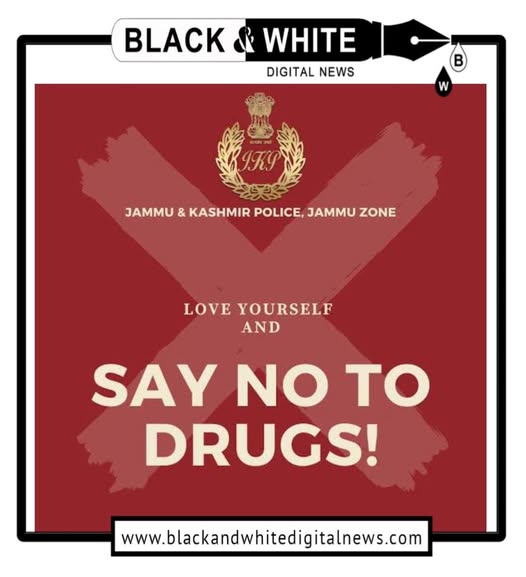Rising Drug Menace in J&K Police Force Exposed: Shocking Arrests Reveal Network of Corruption and Narco-Terror Links.
||Black and White Digital News||
||Parvinder Singh November 15,2024 ||
Jammu: In an alarming development, the arrest of two Jammu and Kashmir police constables within a week on charges of drug trafficking has raised serious concerns about corruption and organized crime within the police force. These arrests underscore the growing threat of drug trafficking infiltrating law enforcement ranks, leaving the region’s security compromised and the public’s trust eroded.
On November 7, Parwaiz Khan, a police constable posted in the Jammu and Kashmir Police Crime Branch, was arrested alongside his two wives, Nargis Bhat and Parveen Akhtar, for their involvement in an elaborate narcotics network. Police sources revealed that Khan exploited his position to acquire drugs from narco-terrorists, supplying his wives who, in turn, sold the narcotics to a wide client base across Jammu. The operation appeared meticulously planned, with his family playing an active role in the distribution. Authorities uncovered a stash at his residence, which included 1 kg 76 grams of ganja, 60 grams of charas, 22 mobile phones, a weighing machine, Rs. 25,640 in cash, and various tools used for processing heroin, also known as “chitta.”
Just days later, on November 13, another constable, Selection Grade Mohammad Mukhtiyar, was apprehended on similar charges. Acting on reliable intelligence, police officers from the Government Medical College (GMC) police post conducted a raid, finding Mukhtiyar near the mortuary, allegedly conducting drug transactions. He was arrested on the spot, and heroin-like substances along with cash were seized from his possession. Mukhtiyar, posted in the Armed Police 12th Battalion Zewan, Srinagar, was swiftly suspended pending further investigation.
A senior police spokesperson condemned these incidents and reiterated Jammu and Kashmir Police’s “zero-tolerance” policy toward drug abuse and trafficking. “The involvement of police officers in narcotics is a grave betrayal of public trust and an unforgivable offense,” the spokesperson stated, adding that the department is committed to rooting out corrupt elements.
This wave of arrests isn’t isolated; rather, it follows an unsettling trend. In August this year, the Jammu and Kashmir administration dismissed six government employees, five of whom were police officers, over confirmed links to drug trafficking. Among those terminated were Selection Grade Constable Saif Din, Head Constable Farooq Ahmad Sheikh, and Constables Rahmat Shah, Irshad Ahmad Chalkoo, and Khalid Hussain Shah, each of whom allegedly played an instrumental role in various drug networks. Their collective involvement spanned multiple districts, suggesting a broad, interconnected narcotics syndicate operating within Jammu and Kashmir.
The impact of these revelations is particularly distressing, given that several overdose deaths in the area have been linked to narcotics traced back to these networks. According to sources close to the investigation, Mukhtiyar and his associates targeted vulnerable youth, profiting from their addiction and endangering lives. “This is not merely a case of corruption; it’s a public health crisis with deep socio-economic repercussions,” an official stated.
The Jammu and Kashmir Police have been actively working to dismantle such criminal syndicates, but these recent arrests indicate that more vigilance is essential within their ranks. Public outrage has mounted, with calls for stricter oversight, transparent investigations, and perhaps the institution of an independent body dedicated to monitoring police involvement in drug trafficking cases. The question remains: how can the police, tasked with protecting citizens, be held accountable for such heinous breaches of duty?
With the public demanding answers, authorities in Jammu and Kashmir face mounting pressure to not only prosecute these accused officers to the fullest extent of the law but also to enforce robust policies that ensure integrity within the police force.




